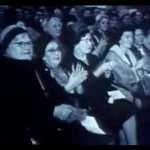Today we’re going to dive on in with Deathscribe 2014’s Ignacio Zulueta, author of “Down by the Lake,” directed by Mary Rose O’Connor. Ignacio’s work has been featured recently in Amios Theater‘s SF branch of the national Shotz ‘brand’ of fun, fast, cheap theater: Beer included with ticket. He has his own live Foley performance this November for Book of Typhon, a supernatural apocalyptic audio play from 2011 Deathscribe alum Colin Johnson. He is aiming for a 2015 writing residency at the Eugene O’Neill Foundation, which provides a month to write plays in O’Neill’s historically preserved country home in Danville, CA. We’ll be talking about a lovely day at the beach, the unforgiving nature of sound, and What Scares Him.
How did you get into horror?
I was eight years old and visiting the beach with my family. We came there every summer we could, and I loved the ocean and my independence equally. There was no helicopter parenting, as much time away from siblings as one wanted. One bright and bustling afternoon I swam out further from shore than I ever had before. The tide was going out, and the white sand floor fell away from beneath my feet til I was left suspended and bobbing over a great green gulf of salt water. A sense of vertigo welled up as I looked down seeing my pale feet kicking so far above a distant sandy bottom below. I turned around to head back to shore.
But the tide was still going out.
I wasn’t a strong swimmer, but I had sudden panic and adrenaline on my side. I kicked and flopped for shore, crawling up the back of one wave and spilling down the other side like a ant traversing sand dunes. I couldn’t feel the sweat wicking off my body into the ocean, but I could feel the exhaustion slowing down my limbs. I could see the crowded shore clearly. I could other people playing in the surf just yards away from me. The shore wasn’t getting any closer, so I waved my hands and yelled, even though the movement pushed me further down into the brine. And when yelling didn’t work, I screamed.
No one noticed. Perhaps all they saw was an excited child, if they saw anything at all bobbing between the ranks of rising and falling waves. Perhaps all they heard was one more high, piping, easily overlooked voice in the confused murmur of music and laughter and children screaming with excitement and delight.
I do not actually recall the moment my feet touched sand again. Any headway I made swimming against the tide might not have been perceptible at the time, especially given how easy it had been to swim the other direction. But, like a snail’s steady progress, I suppose my efforts must have added up, and I dragged myself out of the surf.
But it’s funny, looking back. I don’t recall the moment I knew I was safe, or of the relief I felt, or the precautions I took in the future when returning to that beach.
What I remember most keenly is the fear.
I remember the animal panic. I remember the ebbing of strength and the shudder of involuntary weakness. I remember the shock of going unheard and unseen. I remember the dislocation of hearing the idle chatter of strangers as I dragged myself shivering from exhaustion up onto the sand. They were all having a simply, splendidly, wonderful day at the beach, free from all cares, with no obvious sight or sound to give cause for alarm. Why should they have suspected that anything at all were amiss?
And that’s how I got into horror.
What excites you most about writing horror, compared to other genres?
Horror wastes no time, takes no prisoners, and doesn’t even pretend to have answers for all the questions. The stakes are existential, the themes are subversive, and the contract between performers and audience is clear. The demands on the writer to innovate and surprise are mandatory in the best possible way. Horror has all the pleasure of the ‘Who-dun-it‘ with the added intellectual thrill of the ‘What–is–it?” and the lingering, delectable doubt of the, “Could-It-Happen-Again?”
What was the hook for you in this story? What came first, the story or the sound?
The sound of water. It’s evocative, versatile, and absolutely challenging and cost-prohibitive to execute in any other medium than radio. I’d been dreaming for two years about how to write a play that dealt with the seductive danger of water. After I knew the ambient environment, and began to think of all terrible things that might happen in it, all I needed from that point out were characters who had something to hide.
What do you consider the biggest challenge in writing for “radio,” compared to traditional theatre?
Minimalism in craft coupled with extravagance in concept. I’ve found audio is a genre that is less forgiving to muddle while being more forgiving to the suspension of disbelief. Keeping my scripts short allows the listener to stay sharp and focused. Foreshadowing physical action and sound effects requires a deft turn of phrase to prevent the listener feeling spoon-fed. Holding down cast sizes mitigates confusion, as does distinguishing each characters from one another through diction, dialect, and gender.
What discoveries have you made about storytelling during this process that you are excited to use in future projects?
The character of Deputy Beth Shiner. I get the feeling there’s more tales to tell about her and her peculiar little town.I’m also interested to see how director Mary Rose O’Conner tackles the Foley for the show. With my own Foley project coming up next month, I’m keen to know how she and the Deathscribe techs manage to render not only my soundscape, but the soundscape of the other imaginative plays in the mix. Building an effect can be as pleasurable as building the story it belongs to.
What sound would you most like to see/hear performed in a Deathscribe piece?
The sound of an entire auditorium shrieking in ecstatic, contagious hysteria… and other forms of live music. This is radio, right? Let’s have some music to augment the harrowing mood, or to allow the audience to catch their breath before the next bout of madness takes them.
Do you have any advice for aspiring Deathscribes?
Do whatever it takes to send out your play three days before the deadline. You’ll save yourself the cold sweats of a midnight submission. Those of you who enjoy cold sweats can rewrite the play in the three days before the deadline and try to wring out a new draft with the added failsafe of being able to send in the draft you finished earlier.
What scares you?
Half-open doors in a darkened room. The glassy eyes of dolls. Unmet deadlines. Human apathy.
Fortunately, scaring means caring when you see “Down by the Lake” at Deathscribe 2014 on December 1st at the Mayne Stage Theatre!
^_ _^
.>T<


